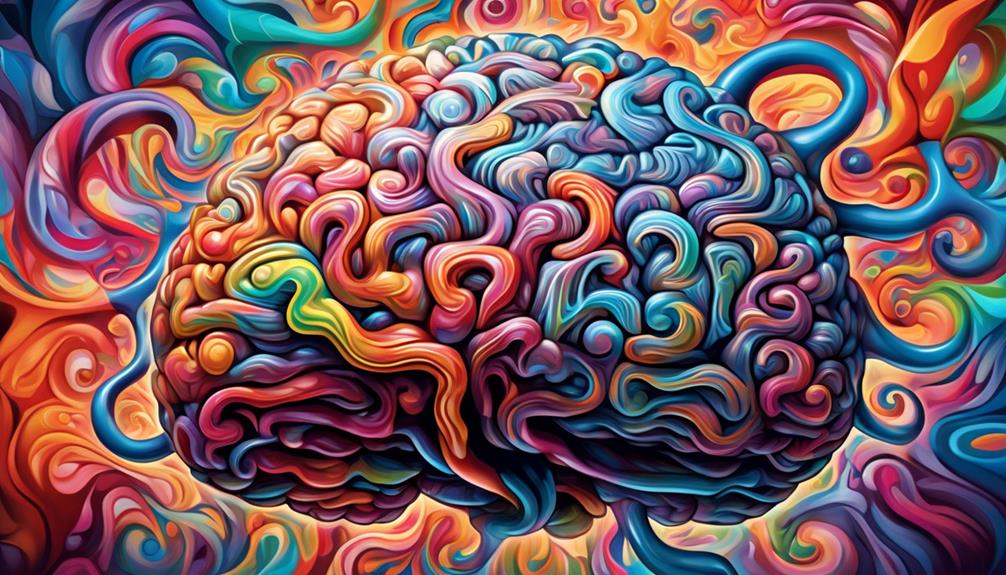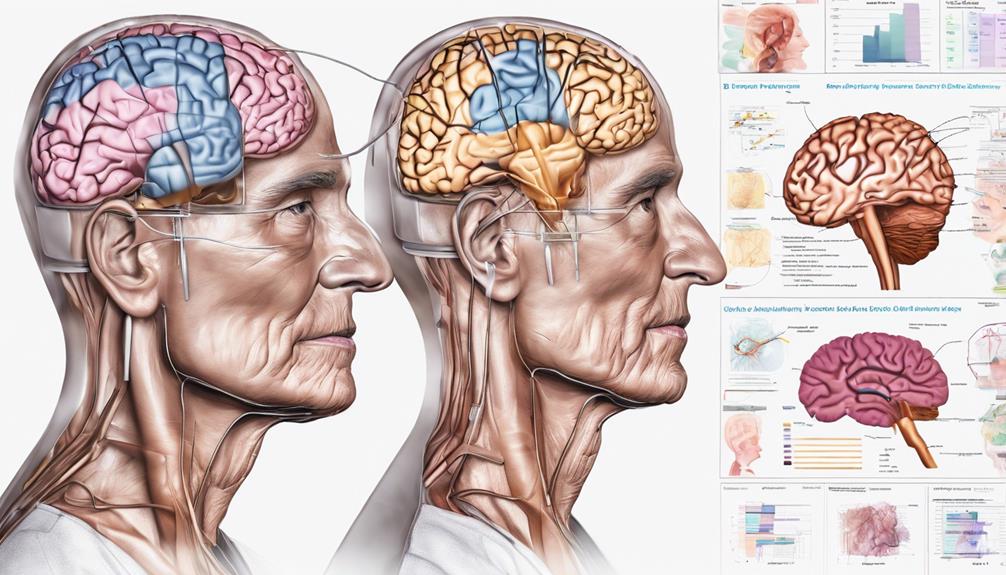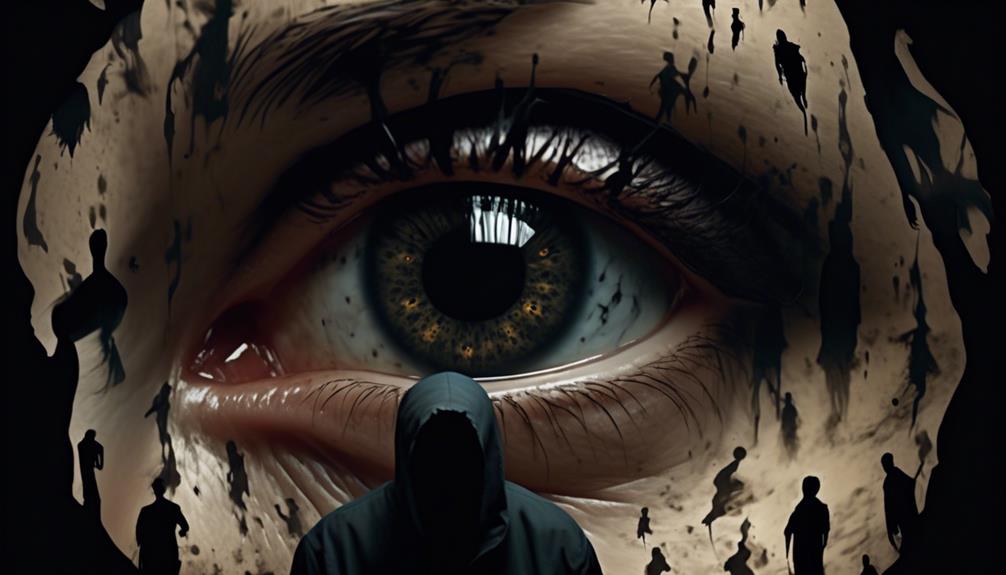Melatonin is occasionally used to help with sleep problems. However, it is crucial to be aware that there have been rare cases where taking melatonin has led to hallucinations.
While the connection between melatonin and hallucinations is not definitively proven, some reports suggest a correlation between the two.
These instances raise questions about the potential effects of melatonin beyond its primary use as a sleep aid.
Further exploration into this topic could shed light on the complexities of melatonin’s impact on the mind and body.
Key Takeaways
- Melatonin regulates sleep-wake cycle and is available as a supplement.
- Common side effects include gastric distress and mood changes.
- Melatonin may interact with other medications and disrupt hormone production.
- Hallucinations associated with melatonin use are rare but reported.
What Is Melatonin?
In our bodies, melatonin is a hormone meticulously produced by the pineal gland in the brain to regulate the sleep-wake cycle. This hormone plays a crucial role in maintaining our circadian rhythm, which is our body’s internal clock that determines when we feel sleepy or awake. Melatonin levels typically rise in the evening as it gets dark, signaling to our bodies that it’s time to sleep.
While melatonin is naturally produced in our bodies, it’s also available in supplement form to help improve sleep disorders such as insomnia or jet lag. However, it’s essential to be cautious when taking melatonin supplements, as there have been rare reports of hallucinations associated with its use. Some individuals have experienced hallucinations shortly after taking melatonin, with symptoms improving once the supplement was discontinued.
If you’re considering taking melatonin or are experiencing severe side effects, it’s advisable to consult a healthcare professional for guidance.
Common Side Effects of Melatonin

Common side effects of melatonin supplementation may include gastric distress and mood changes. When considering melatonin supplements, it is important to be aware of these potential effects. Here is a breakdown of common side effects associated with melatonin use:
| Side Effects | Description |
|---|---|
| Gastric Distress | Symptoms such as nausea, stomach cramps, or diarrhea can occur, especially when taking high doses of melatonin. |
| Mood Changes | Some individuals may experience shifts in mood, such as feeling more irritable or down, after taking melatonin. |
It is crucial to monitor how your body responds to melatonin and speak with a healthcare provider if you experience any concerning side effects. Additionally, starting with a low dose of melatonin and avoiding prolonged use without medical guidance can help minimize the risk of adverse effects. Remember, responsible use and open communication with healthcare professionals are key when considering melatonin supplementation.
Potential Interactions of Melatonin
When exploring the potential interactions of melatonin supplementation, it’s crucial to consider its effects when combined with other medications.
Melatonin supplementation may have interactions with certain medications, potentially affecting their efficacy or side effects. It’s advisable to consult with a healthcare provider before combining melatonin with other drugs.
Evidence suggests that melatonin, a hormone naturally produced by the body, can disrupt the production of other hormones when taken in supplement form. This disruption may lead to unforeseen consequences, especially for individuals with hormonal imbalances.
Melatonin can cause changes in the circadian rhythm, affecting sleep patterns and potentially exacerbating existing sleep disorders. Understanding the potential side effects and drug interactions of melatonin is essential to prevent adverse outcomes and ensure its safe and effective use in promoting sleep health.
Scientific Research on Melatonin Effects

Research into the effects of melatonin on the body and brain is continually evolving to uncover its potential benefits and risks. Melatonin is a hormone naturally produced by the pineal gland in the brain that regulates sleep-wake cycles. While melatonin supplements are commonly used to improve sleep quality and treat sleep disorders, there are factors to consider, such as potential side effects and interactions with other medications. Scientific research on melatonin effects aims to understand its impact comprehensively.
To provide insight into the current understanding of melatonin effects, we present the following table:
| Aspect | Impact |
|---|---|
| Sleep Regulation | Melatonin can help regulate sleep patterns |
| Side Effects | Hallucinations are rare but reported |
| Interactions with Medication | Consulting healthcare professionals is crucial |
This ongoing research helps healthcare providers and individuals make informed decisions about the benefits and risks associated with melatonin use. It underscores the importance of seeking professional advice before incorporating melatonin into your routine to avoid potential sleep problems or other adverse effects.
Hallucinations Connected to Melatonin
Hallucinations associated with melatonin usage, although rare, have been documented in reported cases. When taking melatonin, it’s crucial to be aware of potential side effects, including the possibility of experiencing hallucinations. Here are some key points to consider:
- Effects of Melatonin:
- Melatonin plays a crucial role in regulating the sleep-wake cycle and is commonly used to address issues like insomnia and jet lag.
- Vivid Dreams:
- Some individuals may experience vivid dreams when taking melatonin, which can sometimes escalate into hallucinations.
- Hallucinations:
- In rare instances, melatonin can lead to hallucinations, where individuals may see, hear, or feel things that aren’t actually present.
- It’s important to monitor any unusual experiences and consult a healthcare professional if hallucinations occur while taking melatonin.
Understanding the potential effects of melatonin, including the rare occurrence of hallucinations, is essential for safe and responsible usage of this supplement.
Frequently Asked Questions
Can Melatonin Cause Nightmares and Hallucinations?
Nightmares and hallucinations have been reported with melatonin use, prompting concern. It’s essential to monitor these effects closely.
Adverse reactions like these can be alarming and require immediate attention. We must stay vigilant when experiencing unexpected symptoms and seek medical advice promptly.
Awareness and caution are key when exploring the effects of melatonin on our well-being. Let’s prioritize our health by being informed and proactive in managing any potential side effects.
Does Melatonin Induce Psychosis?
Yes, melatonin can have varied effects on individuals, including potential implications for inducing psychosis.
While not a common side effect, isolated cases have been reported linking melatonin usage to psychotic episodes.
It’s crucial to monitor any unusual symptoms closely and consult a healthcare provider promptly if experiencing severe reactions.
Responsible use, adherence to recommended dosages, and professional guidance are essential when considering melatonin supplements to mitigate potential risks and maximize benefits.
What Are the Side Effects of Melatonin?
When considering the side effects of melatonin use, it’s essential to note common reactions like gastric distress, mood changes, and potential circadian system disruption with excessive consumption.
It’s crucial to monitor for these effects and consult with healthcare professionals if any concerns arise.
Understanding the potential impacts of melatonin can assist in making informed decisions about its use and managing any adverse reactions that may occur.
Does Melatonin Cause Mental Confusion?
We know that melatonin can indeed cause mental confusion, particularly in cases of overdose or when taken too close to bedtime.
It’s crucial to start with a low dose and monitor its effects carefully.
Various factors like environmental conditions and existing health issues can also play a role in causing mental confusion.
If you experience concerning symptoms, seeking advice from a healthcare professional is recommended for proper guidance and support.
Conclusion
In conclusion, while there have been reports of hallucinations associated with melatonin use, the link between the two isn’t firmly established. It’s important to consider individual differences and potential interactions with other medications.
Could these hallucinations be a rare side effect or simply a coincidence? Further research is needed to determine the true nature of the relationship between melatonin and hallucinations.









